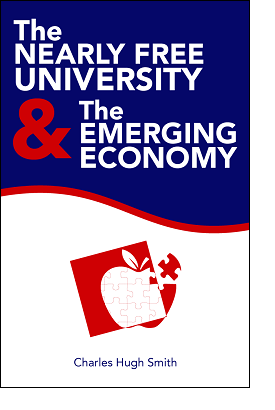What Do We Expect to Happen?
What we can expect to happen generally happens, as the causal chain cannot be disrupted by wishful thinking.
If I go to Las Vegas and gamble with abandon, what do I expect to happen? If I wander alone through a tough part of town waving my iPhone around, what do I expect to happen? If I insist on hiking up a muddy rain forest trail in street clothes in the pouring rain, what do I expect to happen?
We all know what is likely to happen: In Las Vegas, we will lose our stake; in the tough part of town, our iPhone will be stolen, and on the tropical trail, we will get soaking wet.
These consequences are easily predictable. What we can expect to happen generally happens, as the causal chain cannot be disrupted by wishful thinking.
Yet when we re-elect the same politicos who have failed miserably for years, we somehow expect they will magically succeed in providing leadership the next time around. When we eat visibly unhealthy packaged junk food that is engineered to trigger our reward centers with massive doses of fat, salt and sugar, we somehow expect there will be no consequences of eating this "food."
We sit in front of digital devices all day and eliminate physical fitness from our schools, yet we expect there will be no consequences from this inactivity.
We create trillions of dollars from thin air and borrow trillions of additional dollars into existence, yet we expect there will be no consequences from this unprecedented monetary and credit expansion.
We borrow a third of all government expenditures, yet we expect there will be no consequences from this monumental dependence on public debt to maintain the Status Quo.
We buy the cheapest quality goods, yet complain about the poor quality.
We pursue a plan of borrowing our way to prosperity, yet we are flummoxed that prosperity is elusive.
We push everyone with any assets into risky asset bubbles with zero-interest rates, yet we are surprised when asset bubbles pop.
What do you expect to happen? The causal chain cannot be disrupted by wishful thinking. Bubbles will pop, and increasingly leveraged, fragile systems will crash. Hoping causal consequences will magically vanish is a strategy doomed to catastrophe.
Posts and email responses will be sporadic in October due to family commitments. Thank you for your understanding.
The Nearly Free University and The Emerging Economy:
The Revolution in Higher Education
Reconnecting higher education, livelihoods and the economy

We must thoroughly understand the twin revolutions now fundamentally changing our world: The true cost of higher education and an economy that seems to re-shape itself minute to minute.
Things are falling apart--that is obvious. But why are they falling apart? The reasons are complex and global. Our economy and society have structural problems that cannot be solved by adding debt to debt. We are becoming poorer, not just from financial over-reach, but from fundamental forces that are not easy to identify. We will cover the five core reasons why things are falling apart:
 1. Debt and financialization
1. Debt and financialization2. Crony capitalism
3. Diminishing returns
4. Centralization
5. Technological, financial and demographic changes in our economy
Complex systems weakened by diminishing returns collapse under their own weight and are replaced by systems that are simpler, faster and affordable. If we cling to the old ways, our system will disintegrate. If we want sustainable prosperity rather than collapse, we must embrace a new model that is Decentralized, Adaptive, Transparent and Accountable (DATA).
We are not powerless. Once we accept responsibility, we become powerful.
Kindle: $9.95 print: $24
| Thank you, readers, for your much-appreciated generous contributions to this site-- I am greatly honored by your support and readership. |



























